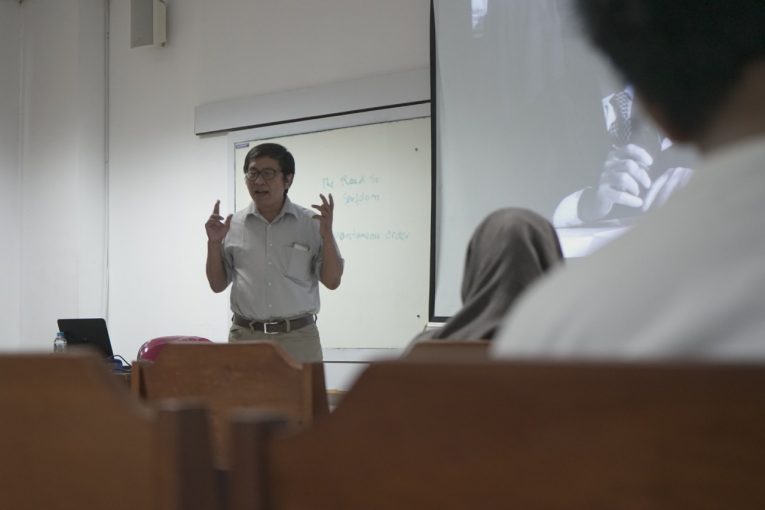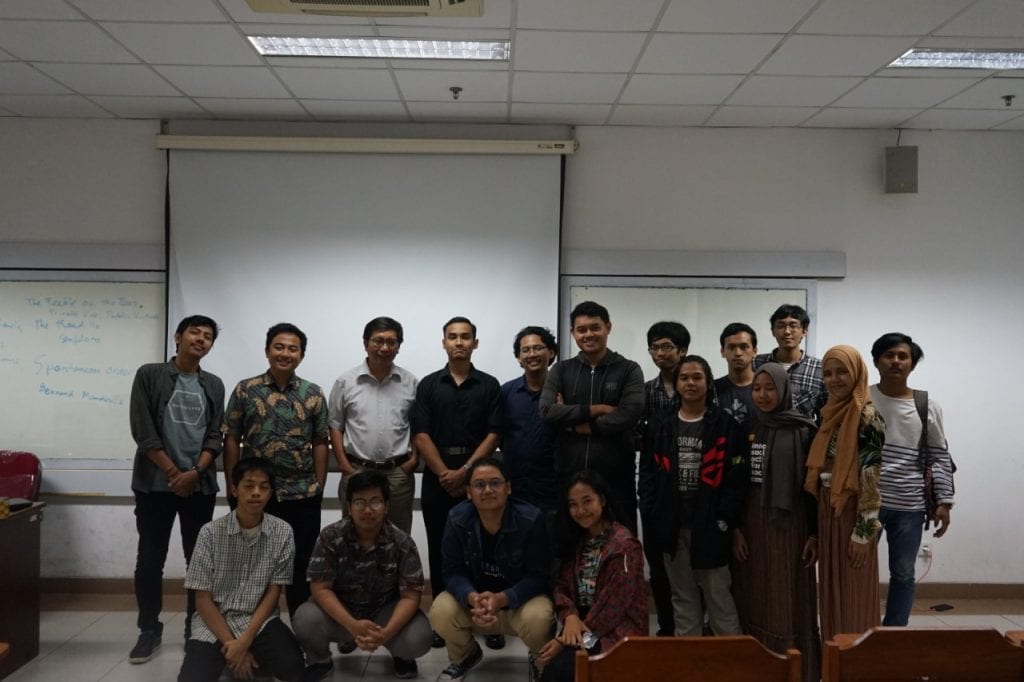
Yogyakarta, March 10th 2020 – Dema Fisipol UGM Kabinet Basudara (Fisipol UGM Student Council Basudara’s Cabinet) held Dipcool #1 or the first series of Dema Fisipol School with discussing over Adam Smith’s Social-Political and Economic Philosophy on March 10, 2020, at 15.30. Discussion with the speaker Drs Muhadi Sugiono, M.A., as a lecturer in International Relations and Fadhil Haidar as the moderator, was held in the room 203 of BA building in Faculty of Social and Political Science UGM. The discussion attended by approximately 15 people from various departments in Fisipol UGM. Despite the little amount of audience, the forum took place smoothly and lively.
Pak Muhadi seemed so enthusiastic to be able to discuss Adam Smith, he admitted, he had not been discussing Adam Smith for a long time. Meanwhile, he had written about Adam Smith as a moral system of capitalism in 1995/1996. He brings back his insights based on Adam Smith’s thoughts who, according to him, described as a moral system in capitalism. The discussion began by displaying a picture of Moscow, a place where Adam Smith had never been to, but his thoughts had been there. In 1994, 5 years after the downfall of the Soviet Union, there was a book published under the title Adam Smith Goes to Moscow that encompasses imaginary stories through a dialogue between two people. Namely the head of an imaginary country in one of the former Soviet Union countries and an economic consultant who is trying to convince the necessity of countries in the former Soviet Union to adopt policies based on liberalization and free trade.

There are several things conveyed by Mr. Muhadi based on Adam Smith’s philosophy regarding the rise of capitalism. “Firstly, there is a tendency to overanalyze Adam Smith’s thought, namely his thoughts are the basis for free trade, which they are not. The basis of free trader thinking lies with David Ricardo, who is talking about comparative advantage. In works of literature, many critics assume Adam Smith is not sophisticated to translate his way of thinking about self-interest into a capitalist system. There is a big mistake in seeing Adam Smith as a component of free trade, where Adam Smith never talked about comparative advantage.
Secondly, Adam Smith tends to be interrupted by a very individualistic way of thinking, which based on self-interest, so that self-interest is the one that inclined by Adam Smith. However, we must realize that Adam Smith has indeed made statements that often quoted and maybe this also used and misused to show that Adam Smith is a person who uses it not because of good but for his benefit. It often used as a basis for describing how Adam Smith strongly believes that social interaction should be built with individual concepts and based on individual interests. One might misinterpret his way of thinking, Adam Smith assumably considered using that thought because he inherited his teacher’s way of thinking, named Bernard Mandeville. He wrote a book titled The Feeble of The Bees, tells about how individualist behavior then produces a good system” explained Mr. Muhadi in great details.
Through Mr. Muhadi’s discussion, Adam Smith considered as a figure who proposes a very individualistic system. It is because he regarded as a person who introduces a mechanism whereby only by thinking using an individualistic system will prosperity be achieved. However, it is different from the public policy because there will be individual limitations.
“We see Adam Smith as someone who thinks in a modern way to build assumptions on humans does not have to be explained in a religious way, which then results in the whole system of capitalism. It is supposed to orient on how to explain what a wise person is. In his writings, Adam Smith went through the assumption that human nature driven by two reasons. First is driven by the need to realize self-happiness, but also driven by his desire to see others’ happiness because otherwise they will be trapped in a very objective situation. So, a wise person, based on his ability to realize self-happiness and happiness of others, there are three characters: which are prudence, beneficence, and justice” added Mr. Muhadi.
After Mr. Muhadi’s session was over, the discussion continued interactively. Several audiences asked concerning Adam Smith’s philosophy and answered well by Mr. Muhadi. Through this discussion, participants expected to be able to learn about the thoughts of the philosopher Adam Smith in terms of social, economic, and political. The forum ended at around 17.30.
